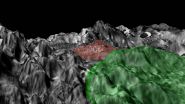Many plastics labeled 'biodegradable' don't break down as expected
2015-03-18
(Press-News.org) Plastic products advertised as biodegradable have recently emerged, but they sound almost too good to be true. Scientists have now found out that, at least for now, consumers have good reason to doubt these claims. In a new study appearing in the ACS journal Environmental Science & Technology, plastics designed to degrade didn't break down any faster than their more conventional counterparts.
Susan Selke, Rafael Auras and colleagues note that to deal with our plastic waste problem, many countries and local governments have adopted laws, such as single-use bag bans, to deal with increasing amounts of trash. Most plastics end up in landfills, where they sit for decades or longer without breaking down. More recently, some manufacturers now make plastics with additives that are supposed to make the products biodegradable. But the effectiveness of this approach has been unclear. Selke and Auras's team wanted to see if the additives were working under typical disposal conditions.
The researchers evaluated plastics containing five different compounds designed to encourage breakdown. They found no evidence that the additives enhanced biodegradability in compost or under simulated landfill conditions, or when buried in soil for three years. They say their findings have wide-ranging implications for consumers, the environment and the companies that make these products.
INFORMATION:
The authors acknowledge funding from the Center for Packaging Innovation and Sustainability at Michigan State University.
The American Chemical Society is a nonprofit organization chartered by the U.S. Congress. With more than 158,000 members, ACS is the world's largest scientific society and a global leader in providing access to chemistry-related research through its multiple databases, peer-reviewed journals and scientific conferences. Its main offices are in Washington, D.C., and Columbus, Ohio.
To automatically receive news releases from the American Chemical Society, contact newsroom@acs.org.
Follow us: Twitter Facebook
ELSE PRESS RELEASES FROM THIS DATE:
2015-03-18
Green tea's popularity has grown quickly in recent years. Its fans can drink it, enjoy its flavor in their ice cream and slather it on their skin with lotions infused with it. Now, the tea could have a new, unexpected role -- to improve the image quality of MRIs. Scientists report in the journal ACS Applied Materials & Interfaces that they successfully used compounds from green tea to help image cancer tumors in mice.
Sanjay Mathur and colleagues note that recent research has revealed the potential usefulness of nanoparticles -- iron oxide in particular -- to make biomedical ...
2015-03-18
In early January, almost 3 million gallons of wastewater from a hydraulic fracturing ("fracking") operation in North Dakota spilled into nearby creeks. The accident highlighted ongoing concerns about what's in fracking fluids and wastewater, and whether they pose a threat to human health or the environment. An article in Chemical & Engineering News (C&EN), the weekly newsmagazine of the American Chemical Society, details what scientists are doing to answer these questions.
Celia Henry Arnaud, a senior editor at C&EN, notes that figuring out what potential harm fracking ...
2015-03-18
This news release is available in Japanese.
Researchers at the Okinawa Institute of Science and Technology Graduate University (OIST) have demonstrated a more robust method for controlling single, micron-sized particles with light.
Passing light along optical microfibers or nanofibers to manipulate particles has gained popularity in the past decade and has an array of promising applications in physics and biology. Most research has focused on using this technique with the basic profile of light, known as the fundamental mode. Researchers in the OIST Light-Matter ...
2015-03-18
Why do some countries seem to develop quickly while others remain poor? This question is at the heart of the so-called poverty or development trap problem. Using mathematics on open data sets researchers now present new insights into this issue, and also suggest which countries can be expected to develop faster. The paper is published in the journal Big Data.
Why do some countries seem to develop quickly while others remain poor? This question is at the heart of so-called poverty or development trap problem. Development economists have identified several potential causes ...
2015-03-18
Submarine groundwater discharge (SGD) consists of a mixture of continental freshwater and seawater, which recirculates through the coastal aquifer. In addition to its importance in the water cycle, as a potentially exploitable water resource and a source of water for brackish coastal environments such as marshes and coastal lagoons, it also can serve as an important source of dissolved chemical compounds such as nutrients and trace and toxic metals.
Now, a study led by researchers from the Institute of Environmental Science and Technology (ICTA) and the Department of ...
2015-03-18
Scientists have produced a new map of the Moon's most unusual volcano showing that its explosive eruption spread debris over an area much greater than previously thought.
A team of astronomers and geologists, led by experts in the Institute for Computational Cosmology and Department of Earth Sciences at Durham University, UK, studied an area of the lunar surface in the Compton-Belkovich Volcanic Complex.
By mapping the radioactive element thorium which spewed out during the eruption they discovered that, with the help of the Moon's low gravity, debris from the unnamed ...
2015-03-18
Singapore, 11 March 2015 - A study led by the Genitourinary (GU) oncology team at National Cancer Centre Singapore (NCCS) has revealed conclusive results in reducing toxicities for Asian patients with metastatic renal cell carcinoma (mRCC) or cancer that has spread beyond the kidney.
The seven-year study began in 2007 and the findings revolutionised the standard protocol for patient management in NCCS with an attenuated-dose regimen of sunitinib for patients with mRCC.
The new treatment regimen for sunitinib has been accepted by oncologists in Singapore. For the patients, ...
2015-03-18
The fishing industry will have difficulty complying with new EU Common Fisheries Policy (CFP) rules banning the throwing away of unwanted fish, according to research at the University of Strathclyde.
The aim of the regulations, which come into force in January 2015, is to reduce waste and improve fish stocks - but the Strathclyde study concluded that this outcome was uncertain.
It found that, over time, quantities of fish discarded have declined since the early 1980s - because overall catches have decreased. However, the proportion of catch which is discarded has increased ...
2015-03-18
Epilepsy is a very prevalent neurological disorder. Approximately one-third of patients are resistant to currently available therapies. A team of researchers under the guidance of the Institute of Cellular Neurosciences at the University of Bonn has discovered a new cause to explain the development of temporal lobe epilepsy: At an early stage, astrocytes are uncoupled from each other. This results in the extracellular accumulation of potassium ions and neurotransmitters, which cause hyperexcitability of the neurons. The results are being published in advance online in the ...
2015-03-18
Chicago, March 18, 2015 - Laboratory testing among patients undergoing cardiac surgery can lead to excessive bloodletting, which can increase the risk of developing hospital-acquired anemia and the need for blood transfusion, according to an article in the March 2015 issue of The Annals of Thoracic Surgery.
Key points
Excessive lab tests prior to and following cardiac surgery can lead to excessive bloodletting, which can increase the risk of developing hospital-acquired anemia and the need for transfusion during surgery.
The study found that heart surgery patients ...
LAST 30 PRESS RELEASES:
[Press-News.org] Many plastics labeled 'biodegradable' don't break down as expected



